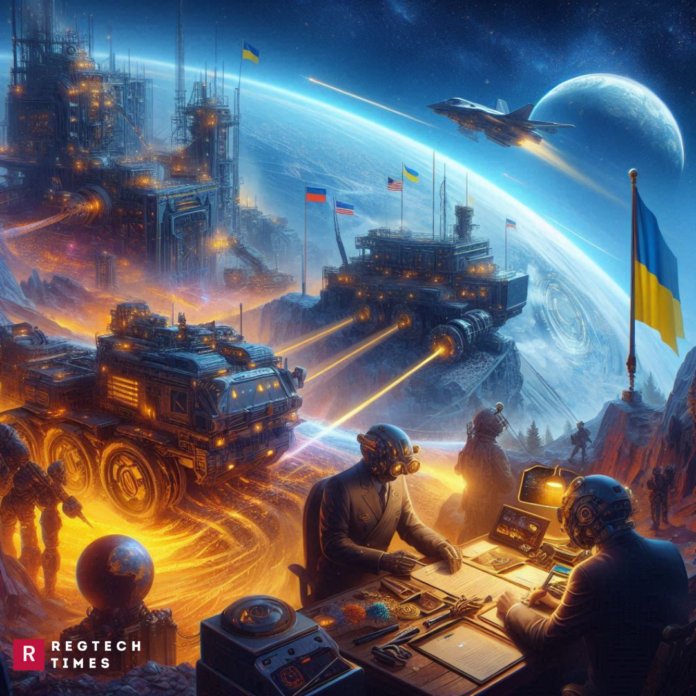New Conditions for Military Aid
The United States has introduced a new requirement for further military and financial assistance to Ukraine. Washington has made it clear that aid will continue only if Ukraine provides access to its vast reserves of rare earth minerals. These minerals are crucial for modern industries, particularly in technology, defense, and aerospace.
Ukraine has already indicated a willingness to exchange these valuable resources for Western support. This strategy was part of a broader plan outlined last year, in which Ukraine highlighted its mineral wealth as a key bargaining tool. The country possesses an abundance of critical minerals, estimated to be worth trillions of dollars. These include metals such as titanium, lithium, uranium, and graphite, which are essential for manufacturing everything from fighter jets to electric vehicle batteries.
The demand for these minerals has surged in recent years. Many countries, particularly in the West, are trying to reduce their dependence on China, which dominates the global supply of rare earth elements. By securing access to Ukraine’s resources, the United States and its allies could strengthen their supply chains and limit China’s influence in this sector.
Ukraine’s Enormous Minerals Wealth
Ukraine contains some of the most abundant rare earth mineral deposits in Europe.
These include:
- Titanium: Ukraine possesses around 7% of the world’s known titanium reserves. This metal is vital for industries such as aerospace, medical, automotive, and marine engineering.
- Lithium: Estimated at approximately 500,000 tons, Ukraine’s lithium reserves are among the largest in Europe. Lithium is crucial for battery production, making it a highly valuable resource for electric vehicles and renewable energy storage.
- Gallium: Ukraine ranks as the world’s fifth-largest producer of gallium. This rare metal is essential for semiconductor and LED manufacturing, playing a key role in modern electronics.
- Neon Gas: Ukraine is a significant global supplier of neon gas, which is used in semiconductor production. This makes the country an essential part of the global electronics industry.
- Nickel, Zirconium, and Graphite: These minerals are also found in significant quantities, further strengthening Ukraine’s position as a potential key supplier in global markets.
Given these vast reserves, Ukraine has been identified as a major potential supplier of critical raw materials to Europe. The European Union has been working to encourage the export of these materials, recognizing their importance in sustaining the continent’s technological and economic growth. The European Commission has even stated that Ukraine’s accession to the EU could provide significant benefits by securing a stable supply of these essential minerals.
Challenges Amidst the Ongoing Conflict
Despite Ukraine’s rich mineral resources, several significant challenges stand in the way of fully exploiting and exporting them. The ongoing war with Russia has led to the occupation of key mining regions, making resource extraction difficult. According to experts, two of Ukraine’s four known lithium reserves may now be under Russian control. The regions of Zaporizhzhia and Donetsk, which hold major mineral deposits, remain occupied by Russian forces.
Mining and processing critical minerals require substantial investment, regulatory stability, and government oversight. However, the war has disrupted Ukraine’s economy and infrastructure, making large-scale mining projects difficult to implement. Establishing a reliable regulatory framework is another challenge, as international investors need assurances before committing capital to these industries.
Despite these difficulties, Ukraine has started taking steps to regulate and develop its mineral sector. The government has begun making mineral data publicly available and has introduced legal measures to attract investment in the mining industry. There is also a strong push to integrate Ukraine’s mineral resources into the European supply chain, ensuring that these critical materials remain accessible to Western industries.
At the same time, Ukraine’s strategic importance in global supply chains has increased. The demand for rare earth minerals continues to grow, making them a crucial factor in Ukraine’s negotiations with Western nations. While the conflict has created uncertainties, it has also highlighted Ukraine’s role in global geopolitics and resource security.
As the world moves toward advanced technology, green energy, and stronger defense capabilities, the need for rare earth minerals will only intensify. This places Ukraine at the center of an ongoing struggle for control over the resources that power modern industries.


